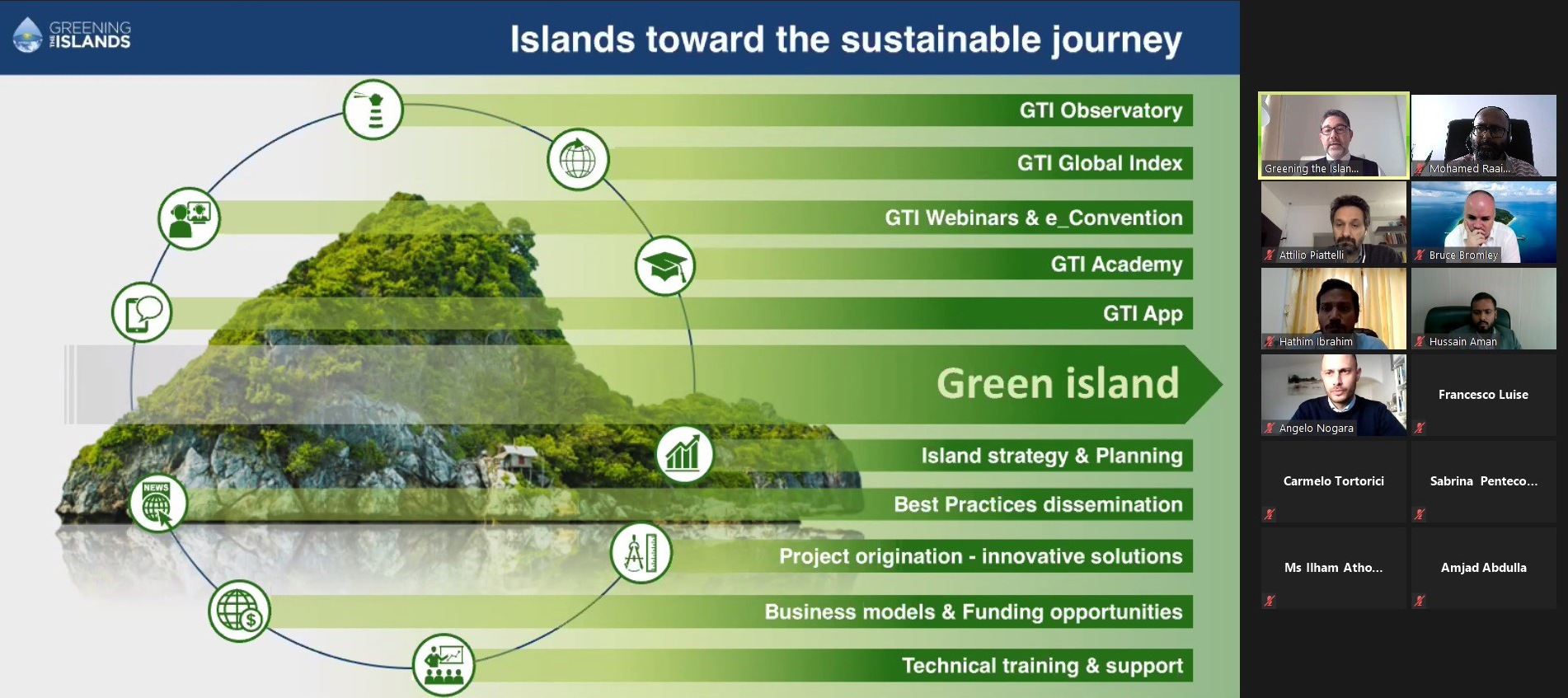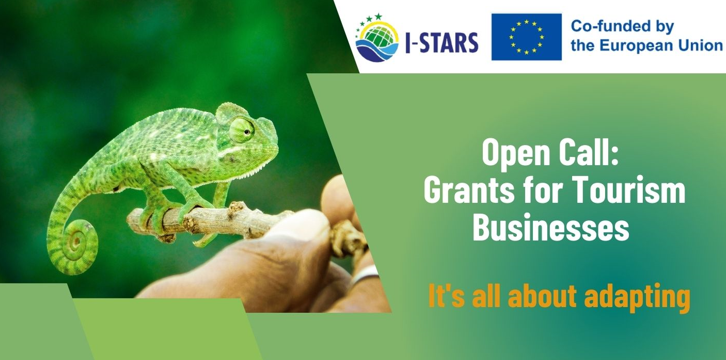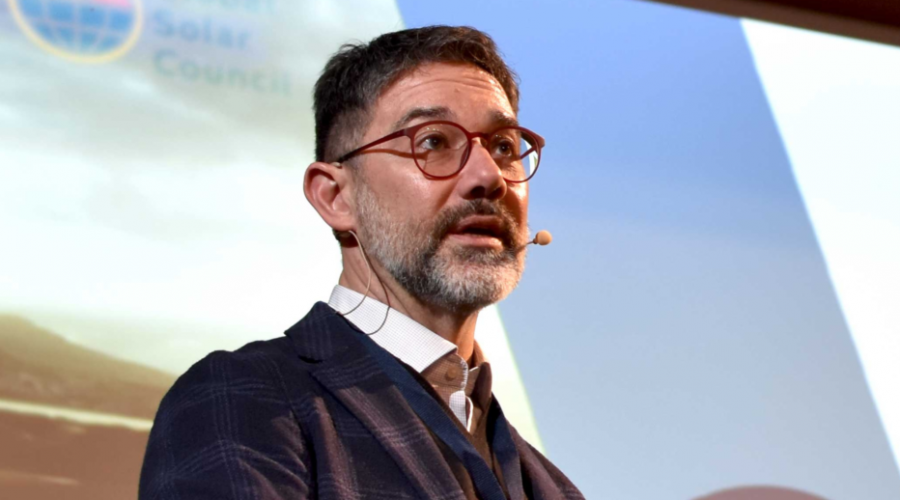March 15, 2021 – Following its 2021 plan, Greening the Islands (GTI) has completed the first round of GTI Observatory (GTIO) task force meetings. In Q1 2021, the task forces on Sustainable Agriculture, Storage & smart grids, Floating offshore wind, and Sustainable Tourism have reunited, gathering the founding members of 2020 and welcoming others among islands, institutions and corporates, growing in their vision and scope. GTI was glad to welcome several islands: Malta, Gozo, Minorca, Canary Islands, Crete, Cape Verde, Maldives, Sicily, which all confirmed really ambitious targets for decarbonization. Furthermore, important international institutions such as FAO, OCTA (Overseas Countries & Territories), Insuleur, ITC (Instituto Tecnológico de Canarias), MITDC (Maldives Integrated Tourism Development Corporation), EASE, Eurobat, Wind Europe and others, which are more committed than ever in the task forces to originate policy recommendations as well as coalitions to answer regional, national and international calls for innovative projects on islands.
The work of the task forces went forward with the creation of new island case studies, policy recommendations, environmental and energetic analysis. Within every task force, it remains crucial to collect best practices worldwide; develop positions and continue the lobbying activity to obtain enabling legislations for technological development on islands and their sustainable transition; originate innovative projects and funding opportunities through PPPs (Public-private Partnerships), PPAs (Power Purchase Agreement), as well as regional, national and international calls and tenders, on the GTIO task forces’ active island case studies. As the pandemic continues to affect communities and economies hard, each of the sectors deepened by the GTI Observatory task forces represent significant recovery opportunities for islands worldwide, and a replicable model for the mainland as well.
The task force “Sustainable Agriculture in Small Islands”, run in cooperation with Insuleur and ITC, picked up from a double focus identified in 2020: how to employ innovative technologies to increase agricultural production and exports while preserving landscapes, endemic products and local communities’ way of living. Cape Verde, Canary Islands and Gozo have been involved as sustainable agriculture case studies – to which a Greek island is soon going to be added – and have presented their challenges and best practices with nature-based solutions. The members of the task force have identified as crucial to elaborate policy recommendations for regional areas concerning EU common Agricultural Policy and Farm to Fork Strategy, which is open for consultations at the European Commission.
The task force “Storage & smart grid, regulatory framework and technologies for islands”, organized in cooperation with EASE and Eurobat, drew on its position paper on the European Commission’s proposal of new regulation on energy storage to elaborate the main focus points for islands. Even though the public consultation phase has ended, GTI will continue to communicate islands priorities to the policymakers in cooperation with the partner industry associations. Another very important upcoming measure is the new regulation on shipment, which will impact islands closely, thus the task force will produce new recommendations to defend islands’ interest. The task force has discussed the storage strategies of islands with a focus on the integration of large-scale, distributed/domestic systems, as well as EVs batteries, and will develop project ideas and coalitions directed at EU calls starting from the case studies of Minorca and Gozo.
The task force “The island resorts: how to become a green destination and reduce costs, while engaging local communities. The Maldives’ case study”, organized in cooperation with MITDC, has discussed the main challenges concerning sustainable tourism, waste management and clean energy with the participation of the ministries of Environment and Tourism and IRENA, on two island case studies, Rinbudhoo, a beautiful and culture rich public island, and Soneva Fushi, a frontrunner island resort. Thanks to the information provided by these islands, GTI has performed a first analysis and proposed to investigate in-depth the environmental and energy contexts for the implementation of innovative solutions for the modernization of networks, the penetration of RES (especially distributed PV systems coupled with storage to also maximize self-consumption of residents and guesthouses) and better treatment of water and waste. Floating PV represents a great opportunity, suitably distanced from the island and with visual impact mitigation. GTI specialists are also analyzing the possibility of implementing a pilot project for electric boat transportation. The actors involved in the task force are working together to assist Maldives achieving the ambitious targets set forth by the Government: reduce single-use plastic, sustainable waste management, net-zero emissions by 2030, acknowledging the importance of greater involvement of local communities with awareness programs on renewables and behavioral change on waste management; and of redirecting central finance through local actions.
The task force “Floating offshore wind power: technologies and policies. The Mediterranean case study”, run in cooperation with Wind Europe, has continued highlighting the potential of this new technology with the participation of the leading international corporates. Government representatives of Sicily, Crete, Canary Islands and Malta have reported their strategies and plans for the implementation of floating offshore systems. The industry leaders have raised the point of too slow and highly bureaucratic permitting process in most countries, as well as the importance of making Maritime Spatial Plans available. European Member States have to implement the MSP Directive and, with the help of Wind Europe, the GTIO task force has identified important focus points for islands and is going to issue recommendations to central governments that will be invited in the next task force meetings. It is paramount to involve timely the stakeholders and the local communities (like the fishermen) to ensure a smooth authorization process, so GTI is collecting best practices worldwide with this purpose. GTI also plans to map authorization processes and bodies involved in the islands, identifying benchmarks and developing recommendations to move private projects already in pipeline faster.
During Q1 2021 talks have also started with important actors to move forward with the task force on RES, water recycling & desalination hybrid systems and to bring to life new task forces on Wave energy technology progress and development trends (Energy Working Group), Policies on bicycle promotion, from business models to regulatory actions and Sustainable maritime transport solutions and ports electrification (Sustainable Mobility Working Group). All the task forces’ works, communications and networking continues on the GTI App Forums, and islands as well as solution providers, academia, R&D bodies, scientific institutions, NGOs and civil society associations are welcome to join the GTI Observatory to participate all to the green islands journey.
Media contacts:












